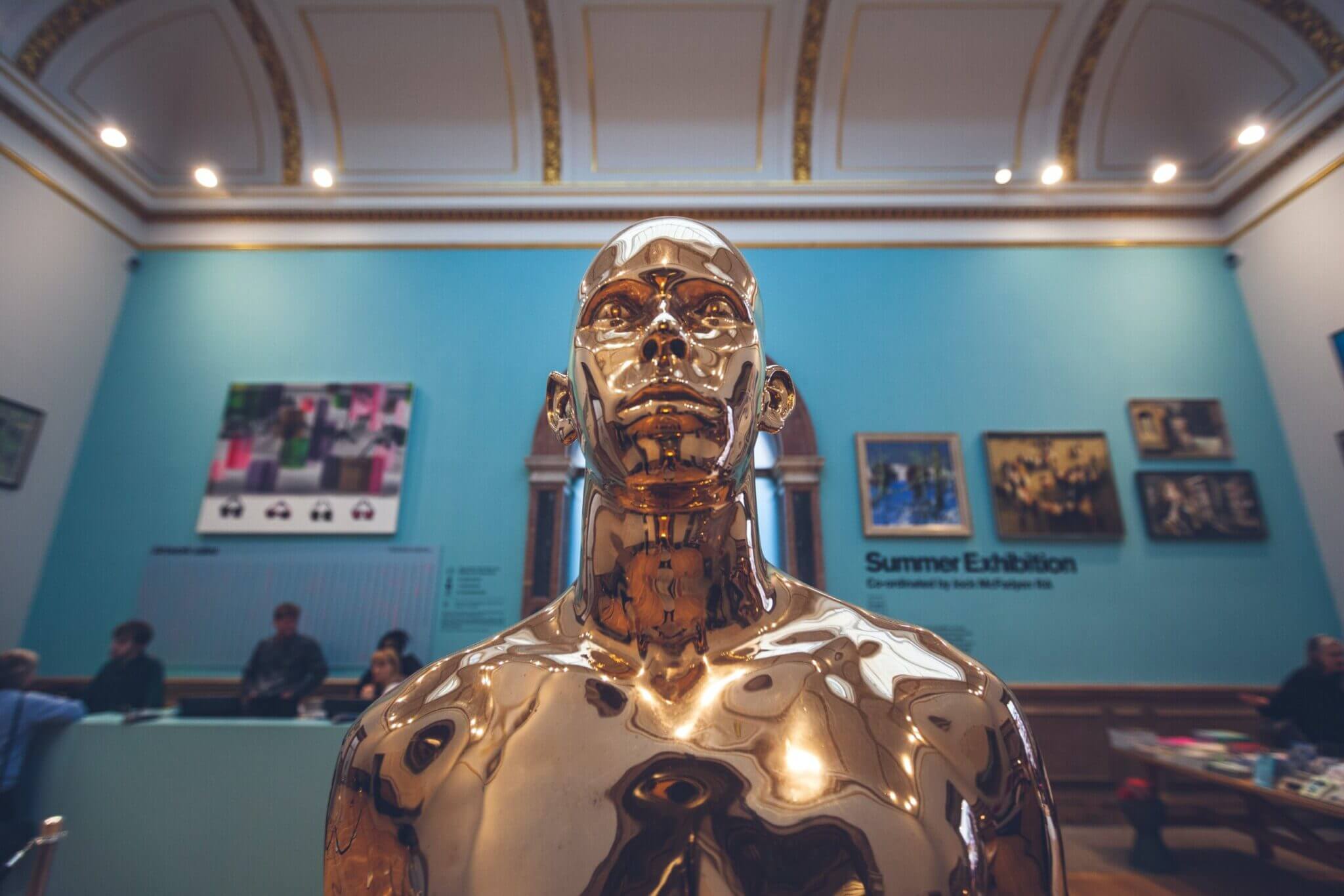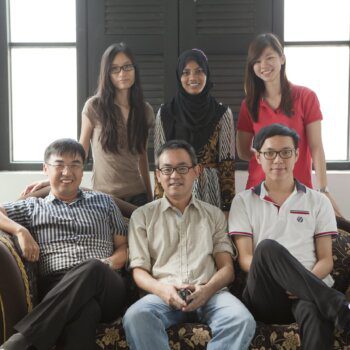Today, there is no shortage of crises to fret over. Global politics are fanning the flames of rising extremism and terrorism. A climate crisis not only risks displacing 1.2 billion humans, but is also fueling the planet’s sixth mass extinction. We’ve already destroyed half the life on Earth; and over 100,000 additional species are following suit, right now. COVID-19 is menacing the entire planet, resulting in two million deaths and four hundred million job losses, so far, while increasing.
Our health, safety and welfare are all being attacked. Psychologically, we have become increasingly addicted to toxic digital platforms, fueling record cases of depression and suicide. Corporeally, Rampant obesity sickening more than one third of the planet is being fed by a broken food system that is only getting bigger and more effective in profiting from our illness…
To be alive today is to live in a treacherous world no one would design, as such, but that we must now all navigate to survive regardless — no one more than the young.
But wait: that’s not all!
If McKinsey and others are right, we are also facing the demise of our own livelihood. McKinsey estimates that up to 800 million jobs will be lost to automation, this decade. Of a three billion-strong global labor force, that’s more than a quarter of all jobs, worldwide. In a twist of irony, rich countries will suffer more, because we can better affordto automate. In the wealthy world, more than a third of all jobs risk being lost.

Stephen Hawking famously said two things:
“Success in creating A.I. [artificial intelligence] would be the biggest event in human history. Unfortunately, it might also be the last.”
He later said:
“The development of full artificial intelligence could spell the end of the human race.”
Let’s assume that AI doesn’t kill us. Not to mention, extremists, the coronavirus, climate collapse or our diets. What it will do — and groups like McKinsey are pointing out — is to force us to reconcile what it is to be human, without life-defining work, as it’s understood today.
Along with love and belonging (or acceptance), purpose is one of our foundational needs. If love helps us feel alive, and belonging makes us feel connected, then purpose is what gives our lives meaning and direction, while simultaneously helping us to feel that we are contributing to the collective wellbeing of our communities.
Purpose is a wholly collectivist concept. Frankly, all three of these are. That’s because to be human is to be, first and foremost, a social creature.
For many, right or wrong, our job is our purpose. We feel that by focusing our energies from adulthood to retirement on something, we are somehow of value, to at least someone. For some, that job is creating and raising a family. For others, it’s proselytizing about a deep belief, like religion, civil rights or truth, to help others. But for most of us, it takes the form of employment, and in feeling accomplished in whatever it is that we’ve chosen to do. The flip side of this is to feel like a failure — in effort expended, or lack thereof — or that we “wasted” our lives by doing something other than what we feel we should have.
You know, the things many of us rue, on our deathbeds. This is a list of our top nine end-of-life regrets. They include being more loving toward others, living our dream, doing more for others, and having chosen more meaningful work.
Whether we live as we should, or fall short of this ideal, the fact is that what we do for a living is a big part of most lives.
So what happens when a quarter to a third of us are out of a job?
Three Potential Scenarios
There are many potential directions human purpose can take in the wake of mass job loss. Let’s look at three of them. First is the possible need to re-educate and retrain large swaths of the workforce with increasing frequency — not just once, but with every advancement of automation into territory we now occupy. Second is concept of retirement from work altogether, wherein our resources for financing necessities is recast in post-capitalist terms. And third is the reinvention of work itself, from a means of value creation to an expression of passion, insofar as if machines and algorithms supply our needs, then human purpose may more closely align with what drives us internally, absent the pressures of survival.
Retraining (With Increased Frequency)
Sixty-two percent of executives believe they will need to retrain or replace more than a quarter of their workforce between now and 2023 — two years hence! — due to advancing automation and digitization.” So says McKinsey. Whether that date trails by a half-decade, or is around the corner, it portends the single largest, fastest, and most consequential retraining of a population in history.
The last time anything of this scale happened was in the transition from agriculture to industry. The material difference with that one, though, was that we had over 100 years to do it. The span between 1850 and 1970 saw agricultural employment plummet from 60% of US employment to just 5%. China’s was faster. Between 1990 and 2015 — just a quarter century — 33% of their workforce were forced to do the same.

The good news is that as drastic a change as this was, overall employment continued to grow, in both cases. Meaning, there were not only enough jobs for those in transition; there were enough for the growing population, and then some.
It makes sense. As capitalism-fueled production skyrocketed, employment turned on its head. While agriculture plummeted, an entire industry around trade, brokerage, manufacture, repair and professional services emerged to profit from it, while jobs in education — aimed at retraining the majority of the workforce — expanded, dramatically, as well. Eventually, tertiary businesses, like financial services to manage new wealth, and entertainment / leisure activities to service a new idle class no longer tied to the fields, rounded off the transition.
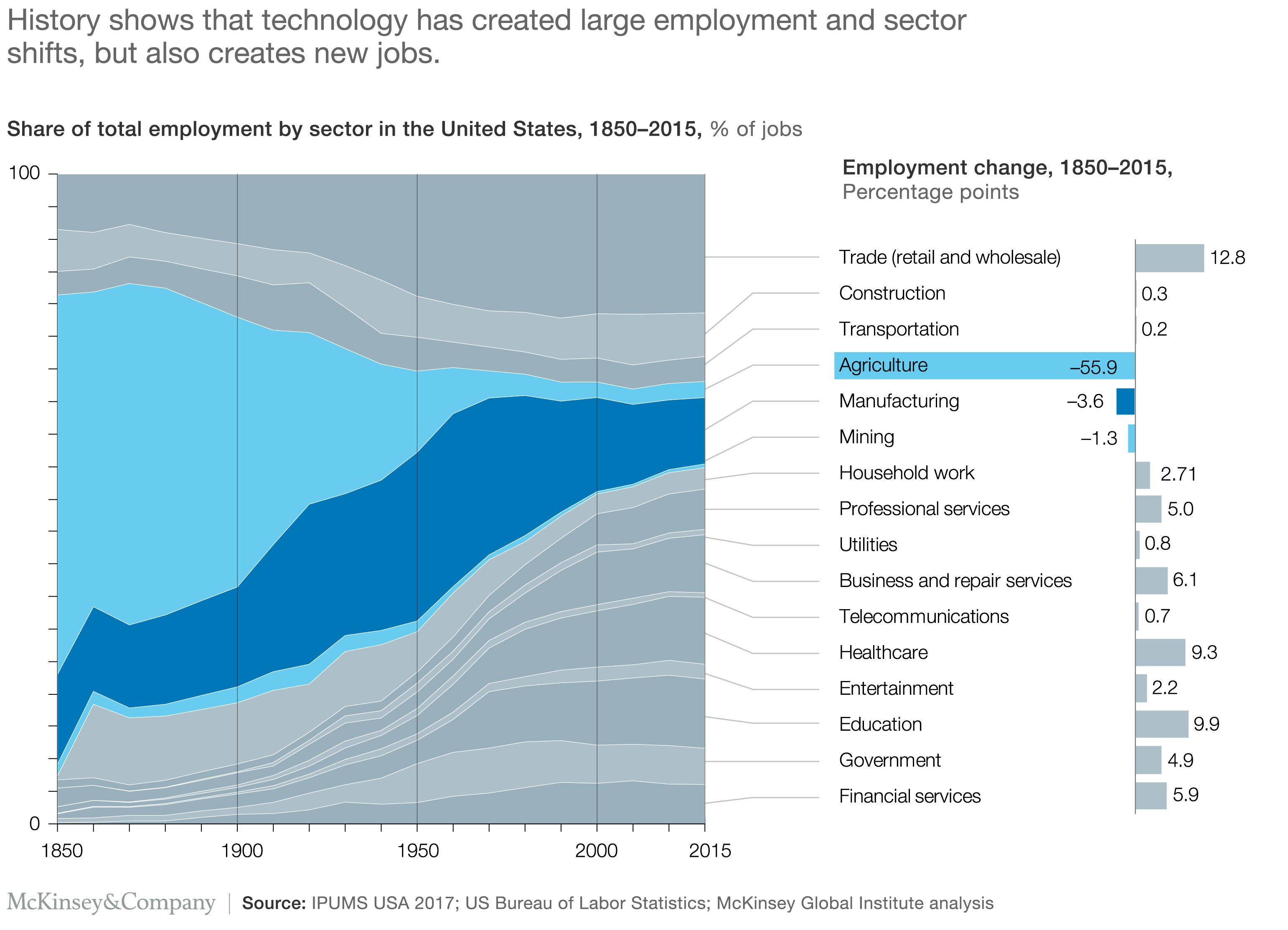
The not so good news is that this time, we won’t have the luxury of a century — or even, possibly, a decade — to retrain people.
Which is where the worry starts.
Bloomberg reported that “More than 120 million workers globally will need retraining in the next three years due to artificial intelligence’s impact on jobs, according to an IBM survey.” One of the biggest impediments to achieving this? The low-skills, low-wage jobs being lost first to robots and A.I. are being replaced by higher-skill jobs that require longer training and transition times. IBM found that “workers need 36 days of training to close a skills gap vs. just 3 days in 2014. That represents a twelvefold increase in training needs, in just a half-dozen years.
Still, 36 days isn’t much in the context of work. But that time doesn’t generate the expertise workers had before they lost their jobs, any more than 3 days in 2014 did. The loss to productivity, and quite possibly salary, or status, will be enormously disruptive; and have to happen more frequently.
It’s not just the duration of training that’s problematic. It’s also the skills themselves that matter, and whether it’s realistic to expect all people to be able to participate equally. The problems there have to do with outright capacity, andcomfort level with the kinds of jobs that will replace the ones we have.
Anyone with an aged parent knows that they are continually confounded by “new-fangled” technologies. My own mother calls herself a “techno-idiot,” and it usually takes a half-hour to guide her toward basic operations that are second nature to those of us who have grown up alongside these things, or whose younger brains are more plastic. My father used to call once a month to check in on me. It grew tenfold in recent years, and invariably consists of him yelling at me about his “broken machines”, and no matter how patiently I try to troubleshoot over the phone, he nearly always yells at me for going too fast for him to follow.
While neither of them is seeking jobs retraining, the point is that generational familiarity and neuroplasticity both play a huge role in whether or not we can — and how long it will take to — retrain the entire workforce.
Forbes reports that “while the [studies claim] that employees can learn new skills, its logic is suspect to the realities.” The seismic shift in work goes beyond what Tom Friedman calls “thick-fingered” jobs. Forbes says, “There’s no hiding from the robots. Well-trained and experienced doctors will be pushed aside by sophisticated robots that can perform delicate surgeries better and read x-rays more efficiently and accurately to detect cancerous cells that can’t be readily seen by the human eye.”
Nature wrote an article about this phenomenon last year. British, German and American medical researchers, doctors and programmers are collaborating to build A.I. engines to read pathologies and cancer tissue, then deliver diagnoses. Two such engines found that 12–14% of brain tumors had been misdiagnosed by trained pathologists. (The machines got them right.) Another engine outperformed seasoned radiologists, reducing the number of false positives by 11% and negatives by 5%, in assessments of lung cancer.
The winners — as any reasonably conversant parent of future professionals knows — will be the coders and computer engineers… until, as Forbes puts it ominously:
“A.I. can learn to code as well as — or better than — the humans.”
“Even those developing [technologies] don’t fully understand how it works or what direction it’s taking,” Forbes writes. “Recent advances in machine learning have shown that a computer — given certain directives — can learn tasks much faster than humans thought possible even a year ago.”
All of this points to a catastrophic job loss largely out of our hands, and while on balance a workforce could be retrained, the speed of change, the power of science, machine learning, and biological limits will all conspire to make this unlike anything humans have faced, and thus may well drive us toward what some, like Elon Musk and Stephen Hawking, have famously insisted is the inescapable outcome of a human world integrated with A.I.
The rise of the Useless Class, and human governments that are forced to deal with a population no longer able to find meaningful employment, at least enough to be able to afford food, shelter, and a modicum of pleasure.
Enter retirement.
Retirement (with a Universal Basic Income)
My wife, Deb, and I were chatting this weekend about how stunning a shift there has been in people’s patterns since we all went into hiding from a novel coronavirus. In particular, we were talking about inertia — that is, the tendency of a body at rest to stay that way. In this case, the bodies are humans, and productivity is the missing ingredient.
Deb said, “The less we need to do, the less we seem to be doing.” She added that she doesn’t see us reverting to our past patterns; that we will settle into a “new normal” in which we simply do less. To make her point, she brought me past a lingerie store on our morning coffee run. “Look,” she said. “What do you see?” I said, “Well, what I don’t see is lingerie.” “Precisely,” she said as she grinned. “What they’re selling now is what people are buying, which isn’tlingerie, but some form of what you always call pajamas,” invoking my preferred taunt of the fact that fewer and fewer people make an effort to dress at all, and that the majority of what people wear on the street now is indistinguishable from what they wear to bed, minus the sneakers.
I digress.
We are all, somewhat alarmingly, becoming more and more like the morbidly obese, mechanically conveyed blobs in Pixar’s WALL-E, unable to walk, even, doing nothing but leisure activities daily, and outsourcing every erg of work energy to a legion of robots and algorithms.

In response to my wife’s provocation, I said that while I might agree wholeheartedly with her observations of (many) humans’ inherent laziness (we need look no further than the trillions of dollars humans spend on things that help us all to do less), we won’t have that luxury until our governments encode our ability to do so in law, in order to bridge the impending loss of income.
The idea of a Universal Basic Income has been floated for years now in the fringes of society. Its origins are even older. English statesman and philosopher Thomas More proposed it in his book Utopia, written in 1516, five hundred years ago. More, whose ideas inspired the American Revolution, proposed a tax plan that would provide a stream of government-provided income to every person, rich or poor.
Martin Luther King, Jr., the civil rights leader whose birthday we celebrate literally today in the United States, proposed a similarly “guaranteed income” in his book Where Do We Go From Here: Chaos or Community? back in 1967.

Even Nobel Prize winning economist Milton Friedman — the “small government” and “free market” godfather whose views helped reshape capitalism in the last half-century — wrote, in Capitalism and Freedom, that a “negative income tax” (UBI) would help overcome a mindset where citizens aren’t inclined to make sacrifices if they don’t believe others will follow suit.
A UBI may become a necessary reality, if McKinsey, IBM and others’ prophecies come to pass, leading to unemployment on a scale never before seen.
Dozens of countries are experimenting with UBI today on various scales, touching every single continent. Spain began testing a UBI with 850,000 of the nation’s poorest households, just last June — providing each with monthly payments of €1,015. Within 4 hours of launching, their website had already logged 50,000 applicants. In Finland, where 2,000 unemployed Finns were each paid €560/month over a two-year period, from 2017–2018 — provided in order to bridge costs until they rejoined the labor force — the anticipated ‘boost’ did not materialize the hoped for reductions in overall unemployment.
This supports my wife’s central thesis: perhaps people simply don’t want to work, if given the chance not to. Perhaps, if a viable alternative to doing so existed, we would welcome it, and ride into the sunset, permanently retired. If the Finns took the money and simply used it — not to fuel their return to work, but to cushion their leisure — then maybe we are involuntarily hinting at our inherent inner sloth, and the end state of employment altogether, à la WALL-E?
Well, we may not have the choice. 25% is a huge percentage of the workforce. If even a small portion of that group leaves the labor pool permanently, countries will have no choice but to fill the gap, or crater. Whether directly (through loss of revenues) or indirectly (as a large out-of-work population aims its energies destructively), an unemployed population can ruin a nation’s fortunes. To set aside the human health dimension of things, just look at what is happening today, economically, under COVID-19.
Paul Collier, the British economist, is famous for modeling the causes of civil wars, arguing that unemployed people (especially young men) are those most likely to be recruited voluntarily to armed groups; and that unemployment is a strong probable cause or motivating factor behind violence and violent conflict,” according to GSDRC.org.
Even with Spain’s leadership in beta-testing UBI, the idea that families can survive long-term — i.e.: meet all of even their most basic needs — with just a few thousand $ every month, is woefully off the mark.
A true replacement for work in the form of a government-subsidized existence will be a seismic shift — one we have never fully tested — from the prevailing life focus of adults, worldwide.
Reinvention (From Need to Choice)
But let’s say we figure this out. What would like look like in a world where an ever-diminishing percentage of human beings earn money through effort? While robots and A.I. aren’t believed to fully supplant human labor, as much as to supplement it, even a modest — but permanent — reduction in employment will force governments to do something to support those humans. The alternative is a bifurcation of a population, with healthy, well-cared for citizens on one hand, and those who descend into some hellish form of terrestrial mayhem, on the other.
It’s hard to imagine any even pseudo-democratic government allowing this.
So let’s imagine for a minute that our non-human labor pool is benign, and doing exactly what we designed it to do, to great success. This could spur nations to reap huge rewards from the output of this 24/7, non-resource-consuming, tireless army, capable of Herculean feats of strength and Einsteinian intellectual prowess.
If the bots are doing the work and generating not just income, and also paying taxes (in the Forbes article, none other than Bill Gates has called for a tax on robots due to the disruption they will cause, by drastically reducing the tax base currently fed by those with work, so that our governments can continue to payfor programs that support human wellbeing), then what’s coming down the road is a boon to humanity, no?
Won’t it mean that we can fully support a new Useless Class (we will rename this, obviously, into something evocative like “Leisure Class”) with our creations? Said another way, won’t it mean that we move from a population that needs to work into one that chooses to? That we will all, finally, be free to pursue our passion projects?
Here, my wife’s prophecy is troubling. “The less we need to do, the less we seem to be doing.” To make her point, she listed a number of friends who have dreamed of having time to do things that — guess what? — they suddenly have time for, at home, from spring cleaning to incubating new businesses. The upshot? Not one of these people has done any of it. What they’ve done instead, is sat on their sofas more, binge-watching Netflix.

Just as many (most?) of us are most productive under constraints like deadlines or threats to job security, the less pressure we have to produce, the more we will quite likely give in to our inner sloth.
There’s another price. A 2019 The Atlantic article about happiness and leisure time cites research pointing to the fact that the happiest people are the ones who are busiest, not the most idle. That research corroborates my own thesis about humans needing purpose to feel good about life. What is that purpose, if not to contribute to our collective success?
So, let’s just say that we do put down our phones and remotes, keep the weight off and continue to resemble our ancestors, rather than the Stay Puft Marshmallow Man from Ghostbusters. What would that look like?

In my own mind, Nirvana, to a human, may look more than a bit like the non-profit world. Not-for-profit organizations exist to generate collective, public or social benefit, in contrast with entities that exist solely or primarily to generate business profit for its owners. In other words, NPOs, as they’re called, exist to do good, reflecting or supporting the moral and ethical values of a society.
That’s a world I’d like to live in.
If — and it’s a long shot — our basic needs were underwritten by a non-human workforce, and this same army of bots and A.I. engines generated adequate revenues and paid adequate taxes to support the Useless Class (I’m not sure who’s buying, if nobody is earning, but anyhow…), then it’s entirely conceivable that humans will focus on helping other humans, agnostic to the economic dimensions of their energies.
This would be fantastic indeed. A human race aimed at communal wellbeing is utopian, to its core. It is the Platonic idea of collectivism — that the good of the many supersedes the good of the few, or individual — come to pass. I wrote about this potentiality in A Post-Capitalist Love Letter, just last week. Collectivism’s greatest impediments have been twofold: the fact that until recently, were have never been ableto supply all of our needs without human labors; and more troublingly, that a bevy of ever-present baser human qualities — greed, resentment and gluttony, among them — have perverted early attempts at collectivist initiatives (like socialism, communism, anarchy), by perverting these structures to surreptitiously feed the few.
To turn collectivism on its head, into some form or another of capitalism.
In the end, as practiced today, capitalism and communism aren’t much different from one another. In both, an already-elite individual or group seeks, then attains power, doing everything possible to amass increasing amounts of it, while the human labor force underpinning it unwittingly contributes to their scheme, whatever we end up calling it. Capitalist and communist nations alike comprise a super-rich and/or legacy elite who have close ties to the ruling party — however they got there, and who are more often than not also super-rich, if not on the way in, then certainly by the time they consolidate their power base. This elite enjoys access to things, people and services that few of their fellow citizens do, while the majority of the work force plods along, plying wares to varying degrees of success, sending a portion of their earnings to a government who in turn doles out varying levels of social services and makes infrastructure investments, in order to keep the engine that feeds them humming. And as long as any member of the establishment/aristocracy doesn’t make waves that gainsay those in (political) power, they are left alone. When they do, on the other hand, they are punished, censored, stripped of their power, and sometimes disappear.
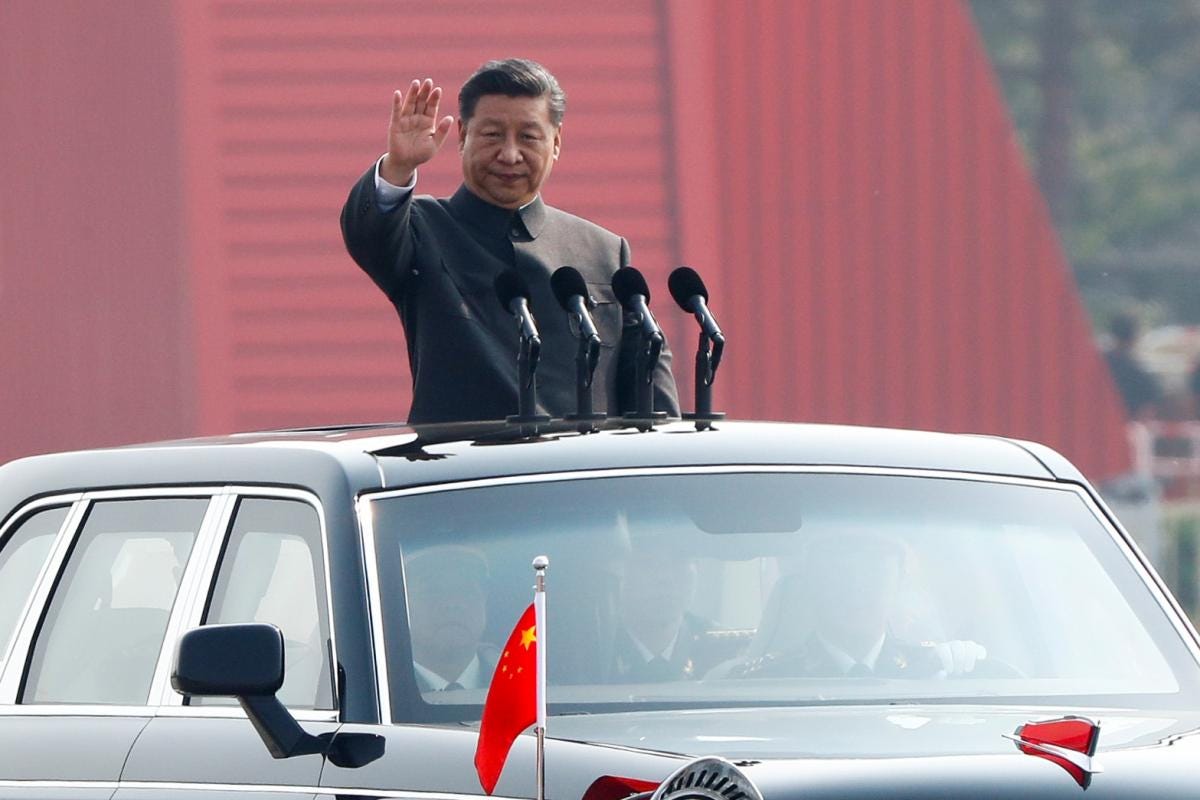
I could be describing Russia, China or the United States.
And so, in a new collectivist future fueled by A.I., robotics and the resultant Useless Class, the large swath of humans who are driven by the greed motive and given to undermining one another in competition will need to be robbed of their chief weapons — that of personal economic gain — in order for this scheme to work. If they aren’t, then the drive for dominance or self-preservation will bifurcate humanity into two imbalanced camps: a tiny class of super-wealthy aggressors with power, and a majority underclass of subsistence earners without any choice but to be thankful for what the bots produce, and their rich overlords mete out.
You know, scraps.
The only way a collectivist future of mutual wellbeing works is if everyone is in it. If not, competition will conspire to have all of humanity scrambling to be on the upside of an upended boat.
If we can somehow see our way to regulating and taxing bots (and their owners!) the way Gates advises us, and doling out a truly liveable UBI income to those who increasingly need it, for which King, Jr. campaigned, with his “Poor People’s Campaign”, then we may yet get to a place of equilibrium with our metal-and-silicon brethren.
Then, and only then, may we spur the next wave of human growth: an era of peace and wellbeing, in which the primary, or sole, focus of our energies is on improving our collective lot, in whatever way inspires us as individuals; because our passions and our energies will no longer be at potential odds, the way all too often, one is ruled by the heart, while the other is ruled by the pocketbook.
Final Thoughts
It’s a long shot. We haven’t shown ourselves to be altruists, as civilized humans. We are consummate competitors, whether we aim it at the Earth itself or at one another. We have done a good job of destroying our planet and our health, in the name of the almighty dollar (or yen, or pound, or dinar). Still, there is a path there. Business Insider Australia reports that at the World Economic Forum (WEF), British professor and co-founder of the Basic Income Earth Network (BIEN) Guy Standing pointed to something under our very noses: that in Britain, each person could’ve received £50/month had the nation’s four-year £375 billion quantitative easing (QE) plan been paid out as UBI instead; and that in the US, the Federal Reserve’s $475 billion in QE would’ve netted citizens $56,000 each over the same period.
Because economics are a major force in unrest, he believes a UBI could liberate countries from the instability that led to, among other things, the election of Donald Trump. Fear of lost jobs was a huge part of it, and Trump’s biggest base — the new Republican Party faithful, in a real sense — is the working poor. “Basic economic security is behind this drift to populism,” Standing warned. “The emancipatory value of basic income is greater than the monetary value.”
The world is taking note. India, the world’s second most populous country, is looking seriously at the feasibility of adopting a national UBI. They’re not alone. Dozens of countries, including half of Europe’s, are experimenting with this.
The bots are coming, whether or not we like it. And if analysts are right, it will quite likely hit this decade, in full force. Whether or not we regulate and tax them remains to be seen. Whether or not UBI is understood for what it could be — a boon to humanity, as a means of finally leaving Earth-killing economics by the wayside — is within view and being seriously studied.
What remains to be seen is what appetite those in charge of making these decisions — our elected or self-appointed leaders — will realize this while they still can and avert the disaster of a global Useless Class without the means to survive, let alone thrive.
The payoff for playing ball? At that same WEF, Harvard professor Michael Sandel suggested — to thundering applause — that a UBI ought to come coupled with some kind of requirement of all citizens who receive it. He called it “A sense of mutual indebtedness wedded to a sense that everyone has a duty to contribute to the common good.”
To my ears, that sounds a lot like collectivism, the way Plato described it in his Socratic dialogue, Republic. In Republic, Plato described the primary notion of societal and political justice, giving it precedence over individualism.
Of harmony.
To describe this, he used his brother in real life, Glaucon, who tees up against Socrates to visit city-states filled with “purely just” and “purely unjust” souls. The purely just ones are full of gender equality, universal education, and societally empowering institutions, after which visit Glaucon wishes to remain, with no interest in “going home”.
The story is far more complex than this, but it stands nonetheless as a philosophical guidepost for the human potential to overcome its own baser instincts, by those who invented philosophy, and most of the systems we still live with, today, including democracy.
We are at a crossroads. For now, we still have the power to direct outcomes. If we do so to everyone’s benefit — without undue prejudice to our own selfish interests, encoding virtuous behaviors and governing structures in the process — then the next wave of human development could well be the best one yet — the holy grail, or Nirvana.
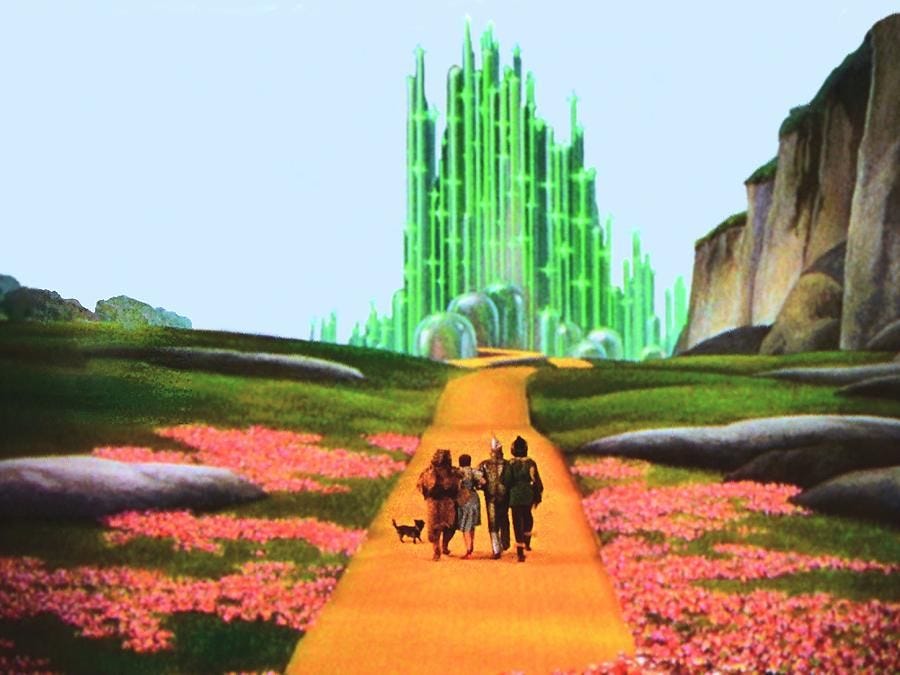
An era of everlasting peace.
No matter whether or not we do this, Hawking was right. A.I. might well be the last invention we make. Which means, we may get just one shot at aiming it.
It is my deep hope that we are able to overcome our baser selves, for the benefit of those, like my own children, who will have to live with the outcome of our choices; and because if we choose the greedy route, then while we may win in the short term, we will no longer be able to outthink or outrun our own creation.
In which case, Hawking’s final fear may be realized: the destruction of humankind.
